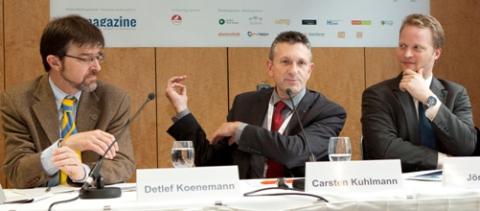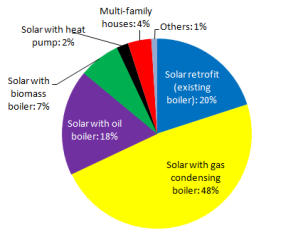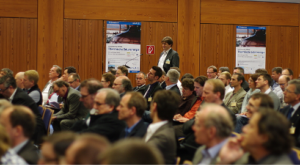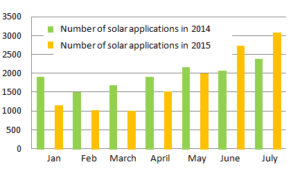Germany: No Upturn in 2012
December 3, 2012
 Despite a good start, 2012 has not seen any upturn in the German solar thermal industry, as latest figures show. Carsten Kuhlmann (in the middle) from the heating manufacturers association BDH expects a newly installed collector area of 1.2 million m², which would be 5 % less than in 2011. The number was part of Kuhlmann’s presentation at the Forum Solarpraxis, a conference in Berlin, Germany, at which scientists, associations and industry representatives discussed the future of solar heating and cooling at the end of November. The photo shows the German renewable energy journalist Dr. Detlef Koenemann (left) and moderator of the session and Jörg Mayer, Managing Director of the German solar industry association BSW Solar.
Despite a good start, 2012 has not seen any upturn in the German solar thermal industry, as latest figures show. Carsten Kuhlmann (in the middle) from the heating manufacturers association BDH expects a newly installed collector area of 1.2 million m², which would be 5 % less than in 2011. The number was part of Kuhlmann’s presentation at the Forum Solarpraxis, a conference in Berlin, Germany, at which scientists, associations and industry representatives discussed the future of solar heating and cooling at the end of November. The photo shows the German renewable energy journalist Dr. Detlef Koenemann (left) and moderator of the session and Jörg Mayer, Managing Director of the German solar industry association BSW Solar.
Photo: Solarpraxis
Kuhlmann’s 2012 estimate is based on monthly data between January and October. The decline in the sales of solar thermal systems is not a result of low sales in the German heating sector in general, as Kuhlmann points out. The overall sales figure for new heating systems in Germany has increased by 6 % between 2011 and 2012 (2012: 537,500 units). Kuhlmann, who frequently calls a solar collector “a must-have in any modern heating system”, expresses the number as the quotient of collector area per heating system: 2.0 m2 per heating system in 2011, 1.8 m2 per system in 2012. According to Kuhlmann, whenever total sales of solar collectors stagnate or shrink, it first affects the companies specialised in solar systems, as they sell many retrofit systems. Providers of complete heating systems, such as Viessmann, have not seen any of their solar thermal sales shrinking, he says. Kuhlmann is convinced that the average German installer has gotten the message. “It takes years to convince installers of changes, but once they accept them, the changes become sustainable,” he says.
One of the main market drivers has always been the oil price, which is currently at a record level. It, however, seems that the effect of it has lessened somewhat: Until 2010, the gas prices in Germany were directly linked to the oil price. In 2011 and 2012, oil prices have risen, but gas prices were at the same level in the first half of 2012 as they had been in 2008. The most popular heating source in Germany is gas anyway, and with the increasing price difference between oil and gas, more and more people are replacing their oil boilers with gas boilers.
To push solar thermal, the Federal Environment Ministry increased the subsidies for solar thermal systems (see news in August this year. The Bafa statistics showed the first effects of this increase in October: 3,600 people applied for subsidies for solar thermal systems, which was one third more than in September. Although there have not yet been any precise figures for November, Bafa confirms that applications increased last month as well. As small systems for single-family houses do no longer receive any subsidies, the figures reflect only part of the market.
The manufacturer statistics collected by associations BDH/BSW Solar do not look that positive: The collector area sales of 95,312 m2 in September represent an increase of 7 % compared to August, but were 23 % below the sales of September 2011. The sales in October of 93,381 m2 were 6.3 % below October 2011. Still, both associations stated in a press release at the end of October that they were expecting the market to grow over the next two months, driven by rising fuel prices and higher subsidies.
Consulting Engineer Dietmar Lange attributes the sales increase during the first months of this year to an upswing in the construction sector. He sees the fault for the currently low solar thermal sales partly in the pending tax rebates for building modernisation: In summer 2011, the German parliament had agreed on a corresponding law. As the law would affect state budgets, too, the Federal Council has to agree to enact it (see news for more information). To date, there has not been any agreement on the law, and it seems that there will not be one in the near future. Consequently, homeowners who are thinking about modernising their building and including a solar thermal system postpone their investments. In the not so unlikely case that no agreement can be reached, the federal government will discuss additional yearly subsidies of EUR 300 million – by far not enough, as the industry associations agree.
More information:
http://www.solarwirtschaft.de/en/start/english-news.html
http://www.solarpraxis.de
http://www.bdh-koeln.de/en/der-bdh.html


